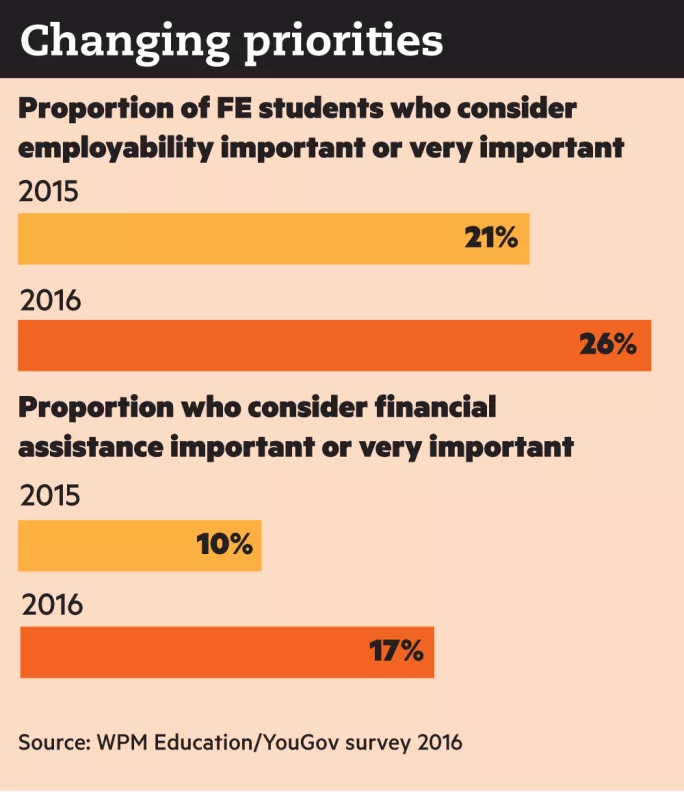Happy students are the key to financial stability

In December last year, the Public Accounts Committee published an insightful report into the financial stability of the further education sector, warning of the “declining financial health of many colleges” across the UK.
The report estimated that by the end of the 2015-16 academic year, 70 colleges would be deemed “financially inadequate”. The main takeaway message was that the government was not doing enough to support FE colleges.
Unfortunately, the situation is unlikely to be addressed in the near future. Further funding cuts are possible, if not inevitable.
There is, however, a solution to the problem of financial stability in the FE sector. That is, simply put, for colleges to reduce their dependency on government funding. To achieve this, colleges must first refocus their efforts on improving student satisfaction and institutional reputation to attract more fee-paying students. Second, they must seek ways to create efficiencies and reduce costs.
Student satisfaction: what does it mean?
On the one hand, it can refer specifically to academic satisfaction, namely course and teaching reputation. On the other, it can refer to satisfaction with the entire student experience, including not just academic quality but also the quality of features such as support services, facilities and social life.
If colleges focus only on the academic side, they run the risk of becoming complacent and failing to understand what really keeps students and their parents happy.
When WPM Education partnered with YouGov on a series of student surveys, we discovered that FE students consider a range of factors in their choice of institution. While the usual suspects, such as course and institutional reputation, were represented, factors relating to support, safety and convenience also emerged as influential.
In 2016, the number of students who considered employability and financial support services to be either “important” or “very important” rose by 5 and 7 percentage points respectively compared with the previous year.
The overwhelming majority (82 per cent) of students questioned in 2016 also considered it important for their institution to have a robust IT data security policy in place. Ease of accessing information was important to 70 per cent of students while the ability to make payments online was valued by 57 per cent.

Discovering that these factors are important to students should come as no surprise. Unemployment remains a big problem, many colleges have suffered data breaches and education as a whole is increasingly under pressure to enter the digital age.
Yet rarely are they given equal weight alongside academic factors. Performance league tables are important. But if FE colleges want to attract more fee-paying students, they need to start differentiating themselves from rival institutions in other ways.
The best way to do this in the short term is to make proactive improvements to the everyday student experience - and by doing so create natural promoters for the institution.
Don’t mull over cuts, start creating efficiencies
Colleges are being forced to do more with less. The best course of action would be to start thinking outside the box and find ways of making savings around internal processes.
Many colleges worry that changes to internal processes will cause unnecessary disruption to already complex systems. But, in reality, significant improvements can be made quickly and without negatively affecting staff or students.
Several of these improvements pertain to how colleges manage their finances.
For example, many still rely primarily on paper-based invoices to bill students for goods and services. According to our research, producing paper invoices is not only time-consuming and outmoded but expensive, at an average cost of £37 per invoice.
Since the cost of an invoice often exceeds the amount of money owed, colleges can even end up making a loss. The simple solution is to cut out low-value invoicing altogether. Taking payment online can save colleges £25 each time. Where invoicing is necessary, colleges should automate it using a more cost-efficient electronic system.
In a similar vein, accepting cash payments is also inefficient. Cash needs to be counted, recounted, handled and stored safely, all of which is a drain on staff, time and money. While a small number of colleges have gone completely cash-free, our research shows that most still accumulate more than £1 million in cash payments each year. By moving this online, even the smallest institutions can save £10-15 per transaction.
When it comes to ensuring the financial stability of FE in the UK, government funding is neither a guarantee nor the only solution. Colleges also have a duty to work proactively to make internal improvements to enhance the student experience and win new recruits as well as to reduce unnecessary costs.
Holger Bollmann is director of WPM Education
@wpmeducation
You need a Tes subscription to read this article
Subscribe now to read this article and get other subscriber-only content:
- Unlimited access to all Tes magazine content
- Exclusive subscriber-only stories
- Award-winning email newsletters
Already a subscriber? Log in
You need a subscription to read this article
Subscribe now to read this article and get other subscriber-only content, including:
- Unlimited access to all Tes magazine content
- Exclusive subscriber-only stories
- Award-winning email newsletters